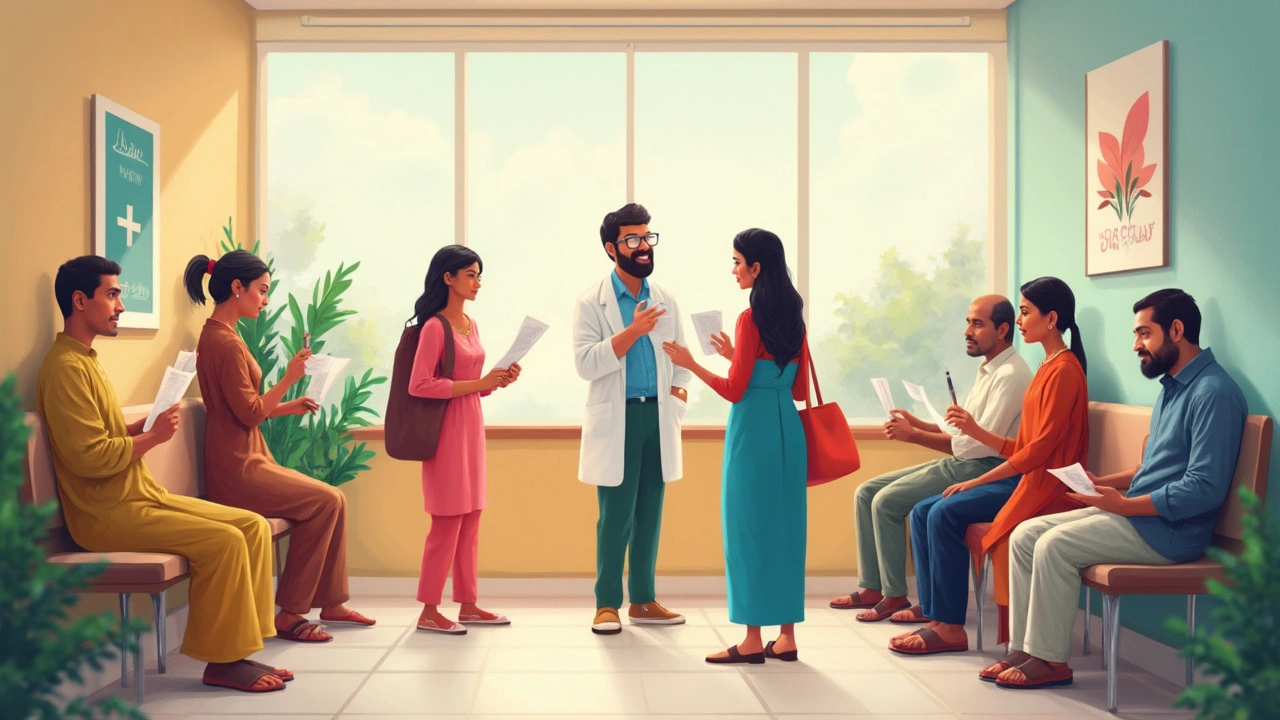
If you’re wondering about the best age to get a full body checkup, you’re not the only one. People love debating this—your gym buddy might swear on yearly checkups at 25, while your dad says don’t bother until after 40. But here’s the thing: age is important, but it isn’t the only factor.
Health checkup packages promise peace of mind, but getting poked and prodded before you even need to isn’t exactly anyone’s idea of fun. Most doctors don’t suggest a full medical workup for perfectly healthy people in their early 20s, unless there’s family history or obvious health red flags. The sweet spot for most folks? It’s usually 30 and up. That’s the age when risk factors for stuff like diabetes, cholesterol, and blood pressure quietly start sneaking up, even if you still feel invincible.
But don’t wait for the calendar to give you permission. If you’ve been noticing things like random fatigue, weird aches, constant colds, or there’s a bunch of family health drama, that’s your cue. Pay attention to what your body’s hinting—even if your driver’s license still screams ‘youth’.
- Does Everyone Really Need a Full Body Checkup?
- What Age Is Too Early (or Too Late)?
- Beyond Age: Other Signs You Should Get Checked
- Tips to Make Health Checkups Worthwhile
Does Everyone Really Need a Full Body Checkup?
Let’s be real—not everybody needs to book a full body checkup every year, especially if you’re young, healthy, and have zero symptoms. If you feel fine, get regular exercise, eat decently, and nobody in your family has any surprise health problems, chances are you can space out those big checkups. Most healthy adults under 30 don’t need them more than every 3-5 years. But let’s look at a few cases where skipping could backfire:
- There’s a family history of early heart disease, diabetes, or cancers.
- You have constant issues—fatigue, sudden weight loss, repeated infections, or odd pains.
- You're a heavy smoker, frequent drinker, or living super-stressed.
- You’ve got a condition like high blood pressure, diabetes, or high cholesterol already.
A respected study out of the Johns Hopkins University School of Medicine showed annual physicals for healthy people didn’t necessarily lower death rates, but regular follow-ups helped catch big things early in people already at risk.
"Full body checkups are most valuable for folks with risk factors or ongoing symptoms—they’re not a magic ticket for perfect health for everybody." —Dr. Ravi Singh, Internal Medicine Specialist
Here’s a quick glance at how often common groups actually need a comprehensive health screening:
| Age/Condition | Recommended Frequency |
|---|---|
| Healthy, under 30 | Every 3-5 years |
| 30-40, no symptoms | Every 2-3 years |
| Above 40, or with risk factors | Yearly |
| Chronic health condition | As advised, often yearly |
If you check any of those risk factor boxes, don’t wait for symptoms to get loud. For everyone else, talk to your doctor and just use common sense. No need to stress about every test out there. Balance is the name of the game here.
What Age Is Too Early (or Too Late)?
This is the question everyone asks: When is it actually smart to get a full body checkup? Is going for screening as a teen overkill? Can you wait until you’re retired? Here’s what the facts say.
If you’re under 25, there’s no proven benefit to those detailed health checkup packages unless you have some medical issues or your family has a big history with early heart disease, diabetes, or cancer. Otherwise, basic checkups during regular doctor visits cover what you need. Tiny chance you’ll find something serious if you feel fine and don’t have symptoms.
Most doctors agree that starting regular full body screening at 30 is a good move, especially if you lead a busy, stressful life or aren’t the healthiest eater. This is when silent risks (like slow-rising cholesterol or sugar levels) can sneak up without symptoms. If you’re not convinced, consider this:
| Age Group | Key Health Risks Start to Rise | Screening Recommendation |
|---|---|---|
| Below 25 | Rare unless family history | Basic annual check |
| 25-35 | Metabolic issues, early diabetes in at-risk people | Consider baseline screening at 30 |
| 35-40 | Blood pressure, cholesterol, thyroid, liver | Annual full checkup |
| 40+ | Cardiac, cancer risk higher | Regular yearly screenings |
Waiting too long can mean catching health issues late. Skipping checkups after 40 is risky business—most lifestyle diseases like hypertension and diabetes show up quietly around this age. The best time to act is before things get complicated, not after.
- Start full body checkups around 30 if you can, or by 35 at the latest.
- If you’re already 40 or older, don’t put it off—book that checkup this year.
- Anyone with a strong family history or existing health worries should think about starting even younger.
The sweet spot: Don’t do it too early, but don’t wait until your joints start creaking. Prevention is less hassle (and less expensive) than treatment down the line.

Beyond Age: Other Signs You Should Get Checked
Age is just part of the story when it comes to health checkups. Lots of people wait until a milestone birthday, but being healthy isn’t just about hitting the big 3-0 or 4-0. Sometimes your body sends out clear signals that it’s time for a full body checkup—even if you’re not that old.
The most obvious sign is a feeling that something’s off. This could be constant tiredness, unexplained weight loss or gain, regular stomach issues, or random headaches you never had before. Trouble sleeping or sudden mood swings can be more than just stress—they might show something’s up with hormones or blood sugar.
- Family history: If diseases like diabetes, heart trouble, or cancer run in your family, you should probably get checked out younger and more often.
- Lifestyle stuff: Smoking, drinking, eating too much junk food, or having a desk job with zero exercise pile on hidden risks.
- Sudden changes: If you get new allergies, breathing trouble, chest pain, or dizziness—don’t wait. Book that checkup as soon as possible.
Here’s a quick look at some numbers showing why it pays to listen to your body:
| Warning Sign | Possible Issue | Estimated Risk Increase* |
|---|---|---|
| Constant fatigue | Thyroid problems, anemia, diabetes | 15-35% more risk if ignored when paired with other symptoms |
| Sudden weight changes | Metabolic syndrome, hormone issues | Up to 30% higher risk for metabolic disease |
| Chest pain on activity | Heart disease | 2-4x increased risk if left unchecked |
*Risk figures are based on data from the Indian National Health Portal and World Health Organization reports.
No one wants a parade of scary tests, but skipping out could mean missing something simple and fixable. Play it smart—listen to what your body tells you, and don’t let the whole ‘wait for a certain age’ thing hold you back from checking up on your own health.
Tips to Make Health Checkups Worthwhile
Don’t just show up and hope for the best. You’re paying good money—and sometimes trading hours of your day—so make it count. Here’s how you can get real value out of your full body checkup and avoid wasting time or money on stuff you don’t need.
- Ask What’s Included: Not all checkup packages are created equal. Some skip basics like vitamin D or thyroid, while others pile on fancy (but unnecessary) tests. Before you book, check the list and confirm that it covers blood sugar, cholesterol, liver and kidney tests, blood pressure, ECG, chest X-ray, and urine analysis. If you’re over 40 or have a specific risk (like diabetes in your family), look for cancer screenings too.
- Don’t Ignore Prep Instructions: Skipping fasting or downing your coffee before bloods can mess up your results. Most tests need an 8-10 hour fast, so hit up your lab or clinic for a checklist a day before—this saves repeat visits.
- Bring Your Medical History: Show up with past reports, a list of any meds or supplements, and even your family’s health quirks. It helps the doctor spot trends or early warning signs that might otherwise fly under the radar.
- Discuss the Results—Don’t Just Collect Them: That “everything normal” line from the front desk? Not good enough. Book a short chat with the doc who reviews your results, and ask what your numbers mean for YOUR lifestyle. Tweak your diet, exercise, or sleep as needed, based on real data, not guesswork.
- Set a Reminder for Next Time: Most folks forget—they get a checkup once and then ignore it for five years. Set a calendar notice to repeat important tests based on age and history. For example, basic blood work might be once a year, but cancer markers or ECG can often wait two or three years unless your doc says otherwise.
Some people worry that checkups will turn up expensive ‘false alarms.’ But if you choose the right package and a clinic with honest experts, the early warning can actually save you stress, money, and hospital visits in the long run.
| Test/Screening | Recommended Age | Frequency |
|---|---|---|
| Basic Blood Panel | 30+ | Every 1 year |
| ECG | 40+ | Every 2-3 years |
| Chest X-Ray | Depends on risk | Doctor’s advice |
| Cancer Screenings (e.g., prostate, breast) | 40-50+ | Every 1-3 years |
Last thing: don’t be shy about talking money or asking for only the tests you really need. Customizing your package not only saves cash but also makes you less likely to blow off checkups in the future.





Rohan Talvani
I am a manufacturing expert with over 15 years of experience in streamlining production processes and enhancing operational efficiency. My work often takes me into the technical nitty-gritty of production, but I have a keen interest in writing about medicine in India—an intersection of tradition and modern practices that captivates me. I strive to incorporate innovative approaches in everything I do, whether in my professional role or as an author. My passion for writing about health topics stems from a strong belief in knowledge sharing and its potential to bring about positive changes.
view all postsWrite a comment